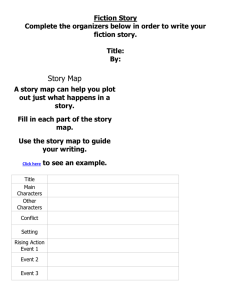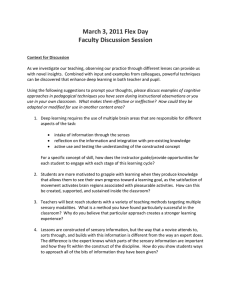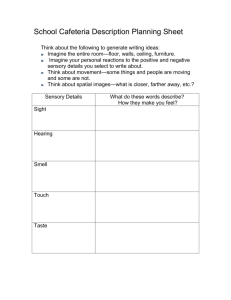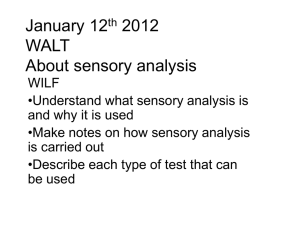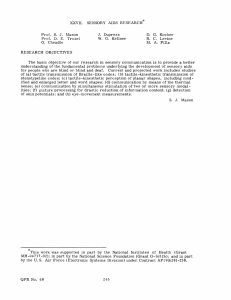Document 13108206
advertisement
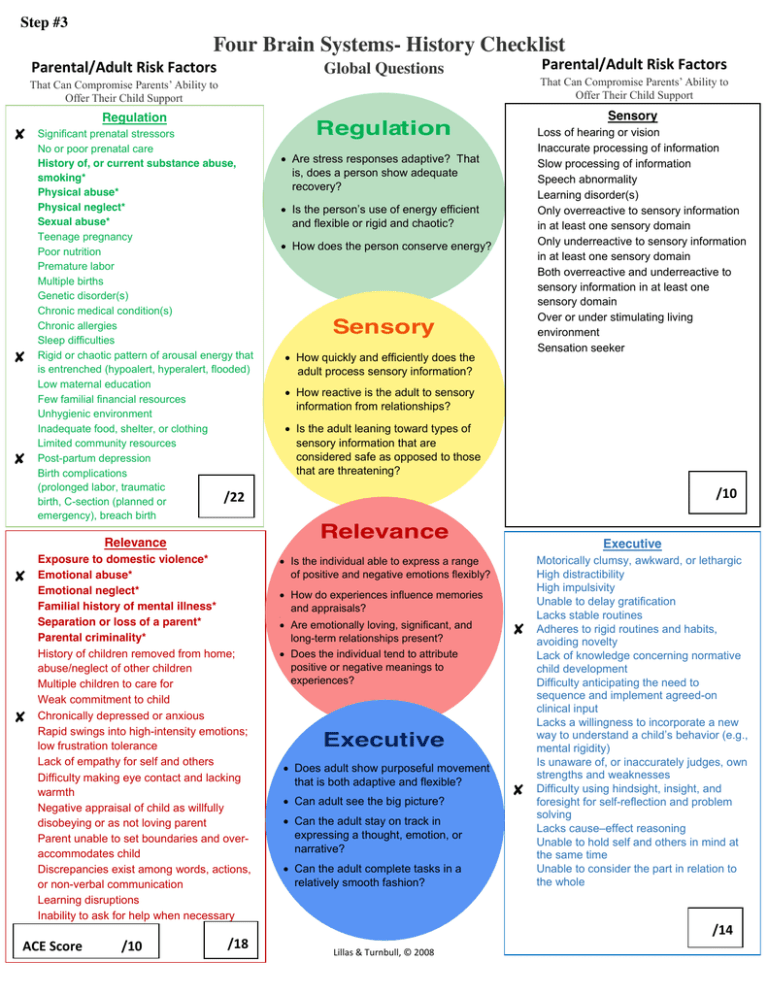
Step #3 Four Brain Systems- History Checklist Parental/Adult Risk Factors Parental/Adult Risk Factors Global Questions That Can Compromise Parents’ Ability to Offer Their Child Support That Can Compromise Parents’ Ability to Offer Their Child Support Regulation ✘ ✘ ✘ Significant prenatal stressors No or poor prenatal care History of, or current substance abuse, smoking* Physical abuse* Physical neglect* Sexual abuse* Teenage pregnancy Poor nutrition Premature labor Multiple births Genetic disorder(s) Chronic medical condition(s) Chronic allergies Sleep difficulties Rigid or chaotic pattern of arousal energy that is entrenched (hypoalert, hyperalert, flooded) Low maternal education Few familial financial resources Unhygienic environment Inadequate food, shelter, or clothing Limited community resources Post-partum depression Birth complications (prolonged labor, traumatic /22 birth, C-section (planned or emergency), breach birth ✘ Exposure to domestic violence* Emotional abuse* Emotional neglect* Familial history of mental illness* Separation or loss of a parent* Parental criminality* History of children removed from home; abuse/neglect of other children Multiple children to care for Weak commitment to child Chronically depressed or anxious Rapid swings into high-intensity emotions; low frustration tolerance Lack of empathy for self and others Difficulty making eye contact and lacking warmth Negative appraisal of child as willfully disobeying or as not loving parent Parent unable to set boundaries and overaccommodates child Discrepancies exist among words, actions, or non-verbal communication Learning disruptions Inability to ask for help when necessary ACE Score /10 Loss of hearing or vision Inaccurate processing of information Slow processing of information Speech abnormality Learning disorder(s) Only overreactive to sensory information in at least one sensory domain Only underreactive to sensory information in at least one sensory domain Both overreactive and underreactive to sensory information in at least one sensory domain Over or under stimulating living environment Sensation seeker Are stress responses adaptive? That is, does a person show adequate recovery? Is the person’s use of energy efficient and flexible or rigid and chaotic? How does the person conserve energy? Sensory How quickly and efficiently does the adult process sensory information? How reactive is the adult to sensory information from relationships? Is the adult leaning toward types of sensory information that are considered safe as opposed to those that are threatening? /10 Relevance Relevance ✘ Sensory Regulation /18 Executive Is the individual able to express a range of positive and negative emotions flexibly? How do experiences influence memories and appraisals? Are emotionally loving, significant, and long-term relationships present? Does the individual tend to attribute positive or negative meanings to experiences? ✘ Executive Does adult show purposeful movement that is both adaptive and flexible? Can adult see the big picture? Can the adult stay on track in expressing a thought, emotion, or narrative? Can the adult complete tasks in a relatively smooth fashion? ✘ Motorically clumsy, awkward, or lethargic High distractibility High impulsivity Unable to delay gratification Lacks stable routines Adheres to rigid routines and habits, avoiding novelty Lack of knowledge concerning normative child development Difficulty anticipating the need to sequence and implement agreed-on clinical input Lacks a willingness to incorporate a new way to understand a child’s behavior (e.g., mental rigidity) Is unaware of, or inaccurately judges, own strengths and weaknesses Difficulty using hindsight, insight, and foresight for self-reflection and problem solving Lacks cause–effect reasoning Unable to hold self and others in mind at the same time Unable to consider the part in relation to the whole /14 Lillas & Turnbull, © 2008 Step #3 Four Brain Systems- History Checklist Child/Youth Risk Factors Global Questions Child/Youth Risk Factors That Increase Children’s Need for Adult Support That Increase Children’s Need for Adult Support Sensory Regulation ✘ ✘ Prenatal maternal stress No or poor prenatal care Intrauterine growth retardation or fetal malnutrition Toxins in utero Premature birth Low Apgar score Meconium Aspiration Jaundice Genetic disorder(s) Infant medical condition(s) Chronic allergies Feeding problems Elimination concerns Poor suck, swallow, and breathe coordination Poor nutrition Sleep difficulties Rigid or chaotic pattern of arousal energy that is entrenched (hypoalert, hyperalert, flooded) Physical abuse* Physical neglect* Sexual abuse* /19 Regulation Are stress responses adaptive? That is, does a person show adequate recovery? Is the person’s use of energy efficient and flexible or rigid and chaotic? ✘ How does the person conserve energy? Sensory How quickly and efficiently does the child process sensory information? ✘ How reactive is the child to sensory information from relationships? Is the child leaning toward types of sensory information that are considered safe as opposed to those that are threatening? /10 For Birth to 3 Executive Relevance ✘ ✘ ✘ Male preterm infant Exposure to domestic violence* Emotional abuse* Emotional neglect* Separation or loss of a parent* Parental criminality* Parental mental illness* Parental substance abuse* Traumatic memories Lack of emotional care due to foster care or orphanage placement Chronically depressed or anxious Rapid swings into high-intensity emotions; no frustration tolerance Lack of empathy for self and others Lack of eye contact absence of interest in others and/or lack of social referencing (overly detached) Highly demanding of others Over accommodating to others Lacks one person in the family who is strongly committed to child and who provides loving care Discrepancies exist between words, actions, or non-verbal communication Unable to learn from previous experiences Inability to ask for help when necessary Relevance Motorically clumsy, awkward, or lethargic Lacks developmentally appropriate use of gestures to communicate needs and wants Lacks developmentally appropriate use of words to problem solve Is the individual able to express a range of positive and negative emotions flexibly? How do experiences influence memories and appraisals? /3 Are emotionally loving, significant, and long-term relationships present? Does the individual tend to attribute positive or negative meanings to experiences? Executive For 3+ ✘ ✘ Does child show purposeful movement that is both adaptive and flexible? Can child see the big picture? Can the child stay on track in expressing a thought, emotion, or narrative? ✘ Can the child complete tasks in a relatively smooth fashion? ✘ ACE Score /10 Loss of hearing / vision Inaccurate processing of information Slow processing of information Speech delay Learning disorder(s) Only overreactive, to sensory information in at least one sensory domain Only underreactive to sensory information in at least one sensory domain Both overreactive and underreactive to sensory information in at least one sensory domain Institutional care or neglect without adequate sensory information/stimuli Sensation seeker High distractibility High impulsivity Unable to delay gratification Lacks developmentally appropriate abilities to sequence activities of daily living Adheres to rigid routines and habits, avoiding novelty Lacks a willingness to incorporate a new way to understand own or other’s behavior (e.g., mental rigidity) Is unaware of, or inaccurately judges, own strengths and weaknesses Difficulty using hindsight, insight, and foresight for self-reflection and problem solving Lacks cause–effect reasoning Unable to hold self and others in mind at the same time Unable to do part to whole reassuring Poor time management /12 /20 Lillas & Turnbull, © 2008
